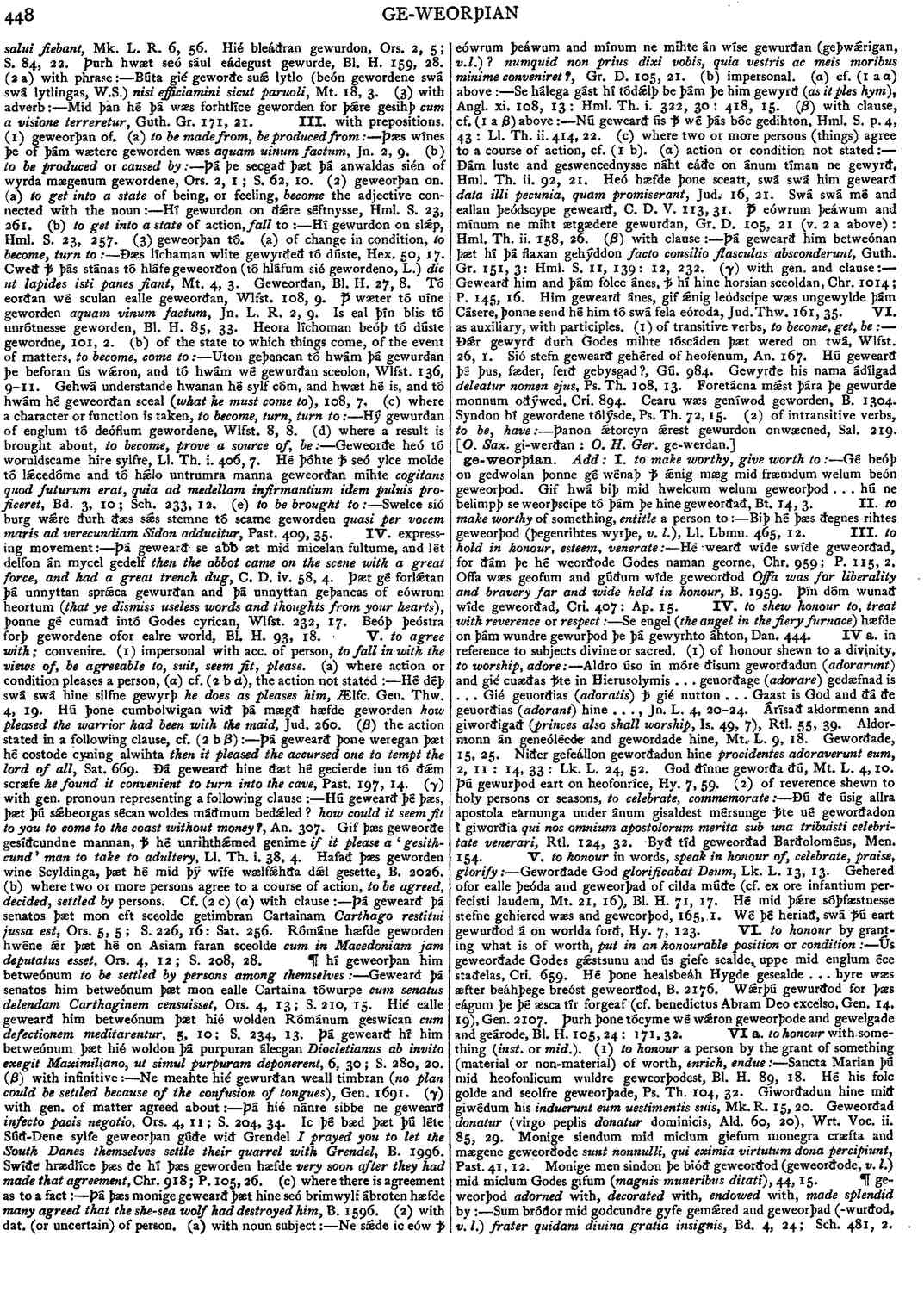ge-weorþian
- verb [ weak ]
-
Gé beóþ on gedwolan þonne gé wénaþ ꝥ ǽnig mæg mid fræmdum welum beón geweorþod. Gif hwá biþ mid hwelcum welum geweorþod . . . hú ne belimpþ se weorþscipe tó þám þe hine geweorðað,
- Bt. 14, 3.
-
Biþ hé þæs ðegnes rihtes geweorþod (þegenrihtes wyrþe,
v. l.
),- Ll. Lbmn. 465, 12.
-
Hé wearð wíde swíðe geweorðad, for ðám þe hé weorðode Godes naman georne,
- Chr. 959; P. 115, 2.
-
Offa wæs geofum and gúðum wíde geweorðod
Offa was for liberality and bravery far and wide held in honour,
- B. 1959.
-
Þín dóm wunað wíde geweorðad,
- Cri. 407: Ap. 15.
-
Se engel (
the angel in the fiery furnace)
hæfde on þám wundre gewurþod þe þá gewyrhto áhton,- Dan. 444.
- IV a. in reference to subjects divine or sacred.
-
Aldro úso in móre ðisum geworðadun (adorarunt) and gie cuæðas ꝥte in Hierusolymis . . . geuorðage (adorare) gedæfnad is . . . Gié geuorðias (adoratis) ꝥ gié nutton . . . Gaast is God and ðá ðe geuorðias
(adoranf)
hine . . . ,- Jn. L. 4, 20-24.
-
Árísað aldormenn and giworðigað
(princes also shall worship,
- Is. 49, 7), Rtl. 55, 39.
-
Aldormonn án geneolécde and gewordade hine,
- Mt. L. 9, 18.
-
Geworðade,
- 15, 25.
-
Niðer gefeállon geworðadun hine
procidentes adoraverunt eum,
- 2, ii : 14, 33 : Lk. L. 24, 52.
-
God ðínne geworða ðú,
- Mt. L. 4, 10.
-
Þú gewurþod eart on heofonríce,
- Hy. 7, 59.
-
Ðfi ðe úsig allra apostola earnunga under ánum gisaldest mérsunge ꝥte geworðadon ł giworðia
qui nos omnium apostolorum merita sub una tribuisti celebritate venerari,
- Rtl. 124, 32.
-
Byð tíd geweorðad Barðoloméus,
- Men. 154.
-
Geworðade God
glorificabat Deum,
- Lk. L. 13, 13.
-
Gehered ofor ealle þeóda and geweorþad of cilda múðe (cf. ex ore infantium perfecisti laudem,
- Mt. 21, 16), Bl. H. 71, 17.
-
Hé mid þǽre sóþfæstnesse stefne gehiered wæs and geweorþod,
- 165, 11.
-
Wé þé heriað, swá ꝥú eart gewurðod á on worlda forð,
- Hy. 7, 123.
-
Ús geweorðade Godes gǽstsunu and ús giefe sealde uppe mid englum éce staðelas,
- Cri. 659.
-
Hé þone healsbeáh Hygde gesealde . . . hyre wæs æfter beáhþege breóst geweorðod,
- B. 2176.
-
Wǽrþú gewurtfod for þæs eágum þe þé æsca tír forgeaf (cf. benedictus Abram Deo excélso. Gen. 14, 19),
- Gen. 2107. þurh þone tócyme wé wǽron geweorþode and gewelgade and geárode, Bl. H. 105, 24 : 171, 32.
- VI a. to honour with something (inst. or mid.),
-
Sancta Marian þú mid heofonlicum wuldre geweorþodest,
- Bl. H. 89, 18.
-
Hé his folc golde and seolfre geweorþade,
- Ps. Th. 104, 32.
-
Giworðadun hine mið giwédum his
induerunt eum uestimentis suis.
- Mk. R. 15, 20.
-
Geweorðad donatur (virgo peplis
donatur
dominicis,- Aid. 60, 20), Wrt. Voc. ii. 85, 29.
-
Monige siendum mid miclum giefum monegra cræfta and mægene geweorðode
sunt nonnulli, qui eximia virtulum dona percipiunt,
- Past. 41, 12.
-
Monige men sindon þe bióð geweorðod (geweorðode, v. l. ) mid miclum Godes gifum (magnis muneribus ditatt), 44, 15. ¶ geweorþod adorned with, decorated with, endowed with, made splendid by :-- Sum bróðor mid godcundre gyfe gemǽred and geweorþad (-wurðod,
v. l. ) frater quidam diuina gratia insignis,
- Bd. 4, 24; Sch. 481, 2.Sit se heofonlica déma on his heáhsettle helme gewurþod. Wlfst. 137, 17.
-
Secg . . . wǽpnum geweorðad,
- B. 250.
-
Adam stóp, gáste geweorðad,
- Gen. 1137, Sweót . . . sigore geweorðod, Jud. 299.
-
Æitele eorlgebyrdum, welum geweorðad,
- Met. 10, 28.
-
Geweorþad
fretns (cf. (?) meterlicere getincnesse gegódod (fretus ),
- An. Ox. 126), Wrt. Voc. ii. 23, 32.
-
Mearh . . . midlum geweorðod,
- El. 1193.
-
Oft ꝥá þeódwitan þus heora meteruers gewurðiað,
- Angl. viii. 332, 16 : 313, 29.
-
Sadol . . . since gewurðad,
- B. 1038.
- Geweorðad, 1450.
-
Ælfheres láf . . . golde geweorðod,
- Vald. 2, 18.
-
Wuldres treów wǽdum geweorííod, ... gegyred mid golde,
- Kr. 15.
-
Salem stód weallum geweorðod,
- Dan. 41.
-
Seó stów is mid manegum godcundum wuldrum swíþe heálíce geweorþod,
- Bl. H. 125, 18 : 197, 12.
-
Þes dæg is geweorþod mid manegum godcundum geofum,
- 133, 2.
Bosworth, Joseph. “ge-weorþian.” In An Anglo-Saxon Dictionary Online, edited by Thomas Northcote Toller, Christ Sean, and Ondřej Tichy. Prague: Faculty of Arts, Charles University, 2014. https://bosworthtoller.com/50445.
Checked: 0